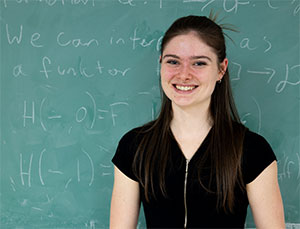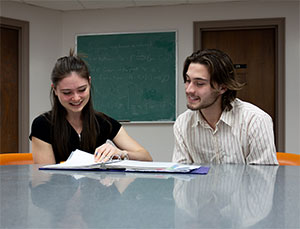The Limit Does Not Exist: Exploring Mathematical Interests with the Directed Reading Program

Mathematics student Chloe Clohosey
For those who are passionate about math, or want to dive deeper into a mathematical component of their area of study, the Directed Reading Program hosted by the Department of Mathematics is the place to be.
The concept is simple. Undergraduate students from any department or faculty can apply. During the application process, they outline their mathematical interests – something they want to learn more about. From there, program coordinators match applicants to current graduate students and junior faculty members to pair up. Over one semester, students work with their mentors to explore their area of interest, reading a book or article with substantial guidance from their mentor to help understand the content.
The program has been so rewarding to third-year mathematics student Chloe Clohosey that she has participated in the program four times. “I was nervous to apply, thinking it would be a lot of extra work on top of my course load. But I told myself, ‘I will never be less busy’ so I gave it a shot. The added commitment has been worth it,” Clohosey explains.
In addition to learning more about linear algebra, group theory and category theory, which prepared her when these topics came up in lecture, Clohosey believes it’s also the soft skills that make the program worthwhile. The program teaches you to learn independently, reading the text by yourself and then working one-on-one to go through it step by step. The presentation at the end of the term teaches you how to communicate scientific information and summarize a term’s worth of work.
“I apply for the program every semester because it is a great opportunity – there is no disadvantage to doing it. Even if you don’t have a lot of time, you can still gain something from it,” shares Clohosey.

Chloe Clohosey (left) with Directed Reading Program mentor Aaron Huntley
Students are expected to meet with their supervisor for one hour each week, work on the project in between those meetings and give a final presentation at the end. While students don’t get course credit for the project, they also are relieved of the pressure of exams and grades.
Although the program is housed in the Department of Mathematics, students from other disciplines are encouraged to participate. Chris Kapulkin, Associate Professor in the Department of Mathematics, explains that “mathematics is universal – it touches upon many disciplines including physics, computer science, chemistry, engineering, and economics. If mathematics is a part of your studies in one way or another, you can benefit from taking part in this program.”
Students who are interested in taking part in the Winter term can apply by January 19, 2024, or attend the Open House on January 17, 2024.

